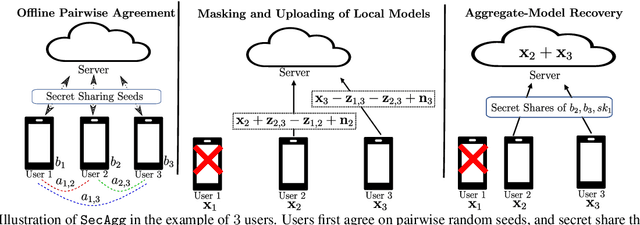Chien-Sheng Yang
LightSecAgg: Rethinking Secure Aggregation in Federated Learning
Sep 29, 2021



Abstract:Secure model aggregation is a key component of federated learning (FL) that aims at protecting the privacy of each user's individual model, while allowing their global aggregation. It can be applied to any aggregation-based approaches, including algorithms for training a global model, as well as personalized FL frameworks. Model aggregation needs to also be resilient to likely user dropouts in FL system, making its design substantially more complex. State-of-the-art secure aggregation protocols essentially rely on secret sharing of the random-seeds that are used for mask generations at the users, in order to enable the reconstruction and cancellation of those belonging to dropped users. The complexity of such approaches, however, grows substantially with the number of dropped users. We propose a new approach, named LightSecAgg, to overcome this bottleneck by turning the focus from "random-seed reconstruction of the dropped users" to "one-shot aggregate-mask reconstruction of the active users". More specifically, in LightSecAgg each user protects its local model by generating a single random mask. This mask is then encoded and shared to other users, in such a way that the aggregate-mask of any sufficiently large set of active users can be reconstructed directly at the server via encoded masks. We show that LightSecAgg achieves the same privacy and dropout-resiliency guarantees as the state-of-the-art protocols, while significantly reducing the overhead for resiliency to dropped users. Furthermore, our system optimization helps to hide the runtime cost of offline processing by parallelizing it with model training. We evaluate LightSecAgg via extensive experiments for training diverse models on various datasets in a realistic FL system, and demonstrate that LightSecAgg significantly reduces the total training time, achieving a performance gain of up to $12.7\times$ over baselines.
 Add to Chrome
Add to Chrome Add to Firefox
Add to Firefox Add to Edge
Add to Edge